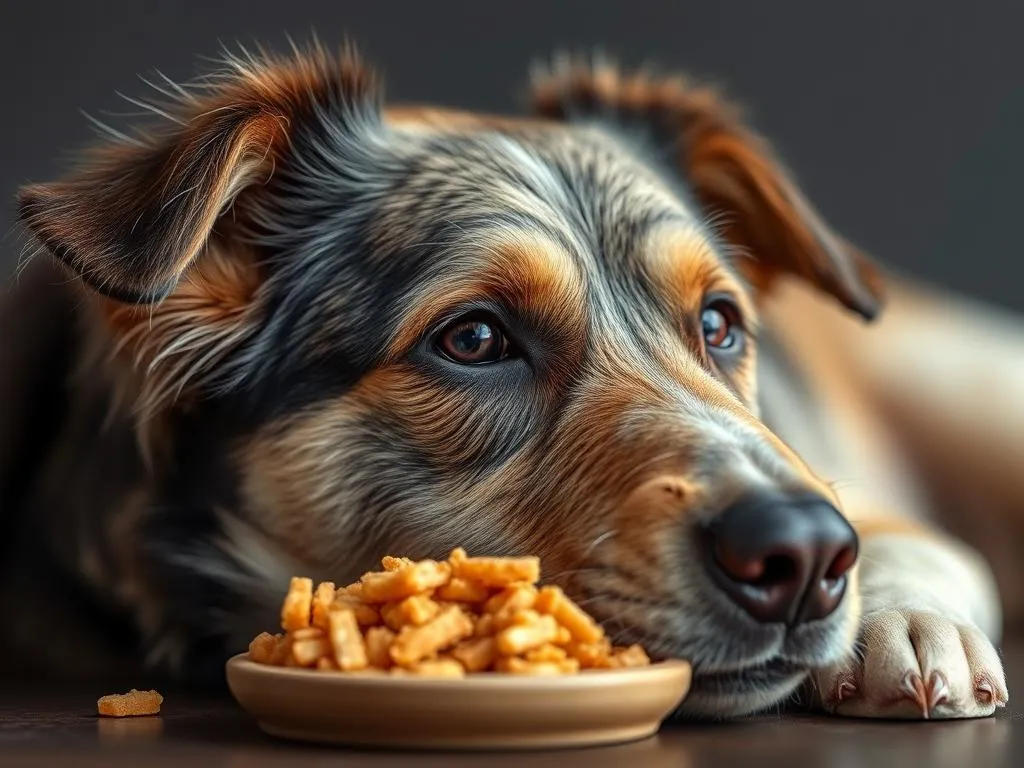
Introduction
Dog nutrition plays a crucial role in maintaining overall health, vitality, and well-being. Just like humans, a dog’s diet significantly impacts their physical condition, including their skin and coat health. A well-balanced diet can lead to a shiny coat, healthy skin, and a reduction in common dermal issues.
In this article, we will explore what food is good for dogs skin and coat and provide comprehensive guidance on dietary choices that can enhance skin and coat health in dogs. Understanding the relationship between nutrition and skin condition will empower dog owners to make informed decisions regarding their pets’ diets.
Understanding Dog Skin and Coat Health
The Role of Skin and Coat
A dog’s skin and coat serve essential protective functions. The skin acts as a barrier against pathogens, while the coat insulates and protects against environmental elements. Additionally, the condition of a dog’s skin and coat is often an indicator of their overall health. A shiny, healthy coat and smooth skin usually signify that a dog is well-nourished and free from underlying health issues.
Common Skin and Coat Issues in Dogs
Dogs can experience various skin and coat problems, including:
-
Dry Skin and Flakiness: Often caused by environmental factors or poor nutrition, dry skin can lead to itching and discomfort.
-
Allergies and Sensitivities: Many dogs suffer from allergies to food or environmental elements, leading to inflamed and irritated skin.
-
Shedding and Dullness: Excessive shedding or a dull coat can indicate nutritional deficiencies or health problems.
Importance of Proper Nutrition
Proper nutrition is fundamental for maintaining skin and coat health. A well-rounded diet can help reduce the risk of common skin issues. Key nutrients that support skin health include fatty acids, vitamins, minerals, protein, and antioxidants. Understanding these nutrients and their sources can help dog owners choose the right foods.
Essential Nutrients for Healthy Skin and Coat
Omega Fatty Acids
Omega fatty acids are among the most important nutrients for skin and coat health.
-
Importance of Omega-3 and Omega-6: Omega-3 fatty acids help reduce inflammation and promote a shiny coat, while Omega-6 fatty acids are crucial for skin barrier function. Both types are essential for overall health.
-
Sources of Omega Fatty Acids: Common sources include fish oil, flaxseed, chia seeds, and walnuts. Incorporating these into your dog’s diet can significantly improve their skin and coat condition.
Vitamins and Minerals
Vitamins and minerals play a vital role in maintaining skin health.
-
Role of Vitamins A, E, and B-complex: Vitamin A supports skin cell production, Vitamin E acts as an antioxidant, and B vitamins contribute to overall skin health.
-
Importance of Zinc and Selenium: Zinc is crucial for skin repair, while selenium helps reduce oxidative stress, promoting a healthier coat.
Protein
High-quality protein is essential for skin repair and overall health.
-
Importance of High-Quality Protein for Skin Repair: Proteins are made up of amino acids, which are necessary for tissue repair and regeneration.
-
Best Protein Sources for Dogs: Good sources of protein include chicken, beef, lamb, fish, and eggs. Including these in your dog’s diet can provide the necessary building blocks for healthy skin.
Antioxidants
Antioxidants help protect the body from oxidative stress, which can negatively impact skin health.
-
Role of Antioxidants in Reducing Inflammation: Antioxidants combat free radicals and reduce inflammation, benefiting skin conditions.
-
Foods Rich in Antioxidants: Blueberries, sweet potatoes, and spinach are excellent sources of antioxidants that can be added to your dog’s diet.
Best Foods for Improving Dog Skin and Coat
Commercial Dog Foods
Choosing the right commercial dog food is crucial for maintaining skin and coat health.
-
Types of Dog Food: Options include dry kibble, wet food, and raw diets. Each type has its benefits, but it’s essential to choose high-quality brands.
-
Recommended Brands Known for Skin and Coat Health: Some reputable brands include Orijen, Blue Buffalo, and Wellness, which offer formulas rich in nutrients beneficial for skin and coat health.
Homemade Diets
Homemade meals can offer control over ingredients and quality.
-
Benefits of Homemade Meals: Preparing food at home allows you to tailor your dog’s diet to their specific needs, ensuring they receive the necessary nutrients.
-
Tips for Creating Balanced Meals: Consult with a veterinarian or pet nutritionist to ensure the homemade diet is balanced and meets your dog’s nutritional requirements.
Supplements
Supplements can provide additional support for skin and coat health.
-
Overview of Supplements that Can Enhance Skin and Coat Health: Omega-3 fatty acid supplements, multivitamins, and probiotics can be beneficial.
-
Recommendations for Safe and Effective Supplements: Always choose high-quality supplements. Consult your veterinarian before introducing any new supplement to your dog’s diet.
Foods to Avoid
Common Allergens
Certain foods may cause allergic reactions in dogs.
- Overview of Common Food Allergens for Dogs: Common allergens include corn, soy, wheat, and dairy. Identifying and eliminating these from your dog’s diet can help alleviate skin issues.
Processed Foods
Highly processed foods can be detrimental to your dog’s health.
- Risks Associated with Highly Processed Dog Foods: These foods often contain fillers, artificial additives, and low-quality ingredients that can negatively impact skin and coat health.
Toxic Foods
Some foods are toxic to dogs and should be avoided at all costs.
- List of Foods that are Toxic to Dogs: Chocolate, grapes, onions, and garlic are examples of foods that can be harmful to dogs. Always keep these out of their reach.
Feeding Guidelines for Optimal Skin and Coat Health
Portion Control
Maintaining appropriate portion sizes is essential for a dog’s overall health.
- Importance of Appropriate Portion Sizes: Overfeeding can lead to obesity, which can exacerbate skin issues. Follow feeding guidelines based on your dog’s size and weight.
Frequency of Feeding
The feeding schedule can also impact skin health.
- Recommended Feeding Schedule for Dogs: Most dogs do well with two meals per day, while puppies may require three to four smaller meals.
Hydration
Water is often overlooked but is vital for skin health.
-
Importance of Water for Skin Health: Adequate hydration helps maintain skin moisture and overall health.
-
Tips for Ensuring Adequate Hydration: Always provide fresh, clean water. Consider adding moisture-rich foods to their diet, like wet dog food or fresh fruits and vegetables.
Recognizing and Addressing Skin and Coat Issues
Signs of Poor Skin and Coat Health
Being aware of signs of poor skin and coat health can help in early intervention.
- Common Symptoms to Look Out For: Look for excessive scratching, redness, flakiness, and a dull coat. These can indicate underlying issues that need to be addressed.
When to Consult a Veterinarian
Professional guidance is crucial for persistent issues.
- Situations that Warrant Professional Help: If your dog experiences severe itching, hair loss, or signs of infection, consult a veterinarian immediately.
Home Remedies for Minor Issues
Some minor skin issues can be managed at home.
- Safe Home Remedies for Dry Skin or Itchiness: Oatmeal baths, coconut oil application, and aloe vera can soothe irritated skin. However, consult with a veterinarian for severe conditions.
Conclusion
In conclusion, proper nutrition is vital for maintaining healthy skin and a shiny coat in dogs. By choosing the right foods and incorporating essential nutrients into their diet, dog owners can significantly improve their pets’ skin and coat health. Evaluating your dog’s diet and making necessary adjustments can lead to noticeable improvements.
FAQs
What is the best diet for dogs with skin allergies?
The best diet for dogs with skin allergies typically includes hypoallergenic ingredients and limited protein sources. Consult a veterinarian for personalized recommendations.
How long does it take to see improvements in a dog’s coat?
Improvements in a dog’s coat may take several weeks to months, depending on the severity of the issue and dietary changes implemented.
Can I give my dog human food for better skin health?
Some human foods can be beneficial, such as lean meats and vegetables. However, always consult your veterinarian before introducing new foods to your dog’s diet.
Are there specific breeds that require special diets for skin health?
Certain breeds are more prone to skin issues and may benefit from specialized diets. It’s best to consult with a veterinarian for breed-specific dietary advice.
References
- [Placeholder for credible sources, studies, and expert opinions related to dog nutrition and skin/coat health.]









